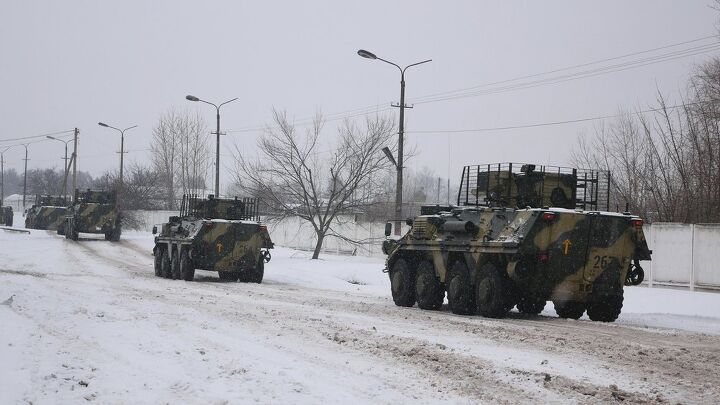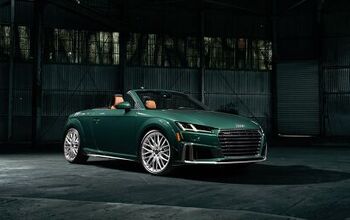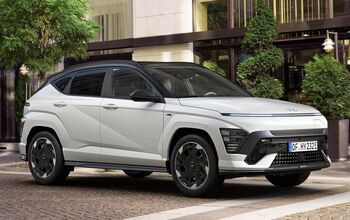Russia-Ukraine War Adding to Supply Problems, Auto Industry Reinventing Itself

Volkswagen Group has stalled production in Germany, citing an inability to obtain sufficient parts from Ukraine. The automaker reportedly is lacking sufficient electrical components for its Zwickau-Mosel plant and the Dresden-based “Transparent Factory” — both of which are responsible for manufacturing VW and Audi-branded electric vehicles.
While the automaker declined to identify any specific suppliers, it said that Zwickau-Mosel will be down for at least four days as the Dresden facility will only need three days of downtime. That should put them both back online by the end of the week. But that’s hardly a guarantee and problems abound elsewhere, some of which are starting to feel borderline ordinary, as the industry continues reinventing itself.
According to the Financial Times, factory closures will result in 1,200 fewer cars being produced per day. This was said to impact the assembly of VW’s I.D. models coming out of Zwickau. Demand has allegedly been so high that the company is even asking staff to drive combustion vehicles to increase the available supply of battery-driven automobiles.
From FT:
Earlier on Friday, Volkswagen chief executive Herbert Diess said that it was “too early to assess the impact” of the war in Ukraine on VW’s business. VW had already offered to fly Ukraine-based staff out of the country a few weeks ago, he added.
Rival German carmaker Mercedes-Benz said it did not yet know if it would face the same interruption of supplies from Ukraine. “We are monitoring the situation closely, but it is still too early to assess the impact of this escalation on our business,” it said in a statement. General Motors told the FT on Thursday it had “limited supply chain exposure” to Ukraine.
Although Russia and Ukraine are small markets for Volkswagen, which sold 9 [million] cars globally in 2020, both countries provide raw materials and components that are crucial to the industry’s supply chain. One large auto manufacturer told the Financial Times its employees were trying to work out whether rail deliveries that come via Russia would be disrupted.
Though the industry is treating the possibility of war-time deficits as little more than an extension of the semiconductor shortage that arrived in 2020. As chip manufacturers began issuing pandemic-related restrictions and transitioning to higher-value products, supply chains for the automotive sector dried up faster than a teardrop on Mercury.
Rolling factory closures have become the norm and automakers are becoming less interested in restoring production rates. Instead, they’re starting to examine how to maximize margins on every vehicle sold as output remains critically low.
While I have no doubt that a ground war occurring a few nations away means major implications for supply chains, automakers have been enduring severe component shortages since 2020 and have started discussing the merits of leaner inventories. Many are now publicly musing vast restructuring efforts that would reduce staffing as they transition toward EVs. But this often seems to be more about appeasing investors than ensuring prolonged profitability from the day-to-day business of being an automaker.
CEO Jim Farley recently said that Ford’s vehicles (gas and electric) weren’t achieving the kind of profitability he was comfortable with. He seemed particularly annoyed that the company’s market valuation remained low compared to a smaller, less established rival like Tesla. The proposed solution? Layoffs and finding ways to make more cash by reducing corporate bloat, ideally while manufacturing fewer cars (but more EVs) overall.
“We have too many people, we have too much investment, we have too much complexity and we don’t have expertise in transitioning our assets,” Jim Farley, Ford’s chief executive officer, said at a Wolfe Research auto conference last week “This management team firmly believes that our ICE and BEV portfolios are under-earning.”
Mary Barra suggested something similar for General Motors, with restructuring looking imminent.
“We’ll never go back to the inventory levels that we were in the past,” Barra told Wolfe Research. “In all the tragedy that surrounded COVID, we have learned a lot on how to strengthen our business, run leaner, work with the dealers, use data analytics to make sure dealers are ordering the right vehicle. There are so many elements where we’ve learned to run more efficiently that we’ll never go back from.”
Ford likewise attributed its desire for change to the global response to the pandemic, saying it was also interested in shifting to a direct-to-consumer sales model. However, you might want to keep in mind that these quotes are coming after record-high vehicle prices and record-low inventories. You know, for an industry that likes to criticize Tesla for being different, everyone sure seems to be blindly copying everything it does. Meanwhile, I’ve been wondering when the parade of excuses will stop being enough and people start expecting the industry to take some amount of ownership for the constant production shortfalls.
[Image: Seneline/Shutterstock]

A staunch consumer advocate tracking industry trends and regulation. Before joining TTAC, Matt spent a decade working for marketing and research firms based in NYC. Clients included several of the world’s largest automakers, global tire brands, and aftermarket part suppliers. Dissatisfied with the corporate world and resentful of having to wear suits everyday, he pivoted to writing about cars. Since then, that man has become an ardent supporter of the right-to-repair movement, been interviewed on the auto industry by national radio broadcasts, driven more rental cars than anyone ever should, participated in amateur rallying events, and received the requisite minimum training as sanctioned by the SCCA. Handy with a wrench, Matt grew up surrounded by Detroit auto workers and managed to get a pizza delivery job before he was legally eligible. He later found himself driving box trucks through Manhattan, guaranteeing future sympathy for actual truckers. He continues to conduct research pertaining to the automotive sector as an independent contractor and has since moved back to his native Michigan, closer to where the cars are born. A contrarian, Matt claims to prefer understeer — stating that front and all-wheel drive vehicles cater best to his driving style.
More by Matt Posky
Latest Car Reviews
Read moreLatest Product Reviews
Read moreRecent Comments
- ToolGuy If these guys opened a hotel outside Cincinnati I would go there to sleep, and to dream.
- ToolGuy Michelin's price increases mean that my relationship with them as a customer is not sustainable. 🙁
- Kwik_Shift_Pro4X I wonder if Fiat would pull off old world Italian charm full of well intentioned stereotypes.
- Chelsea I actually used to work for this guy
- SaulTigh Saw my first Cybertruck last weekend. Looked like a kit car...not an even panel to be seen.


































Comments
Join the conversation
What Matt wrote seems somewhat contradictory regarding Tesla. Tesla is cornering market share while 'losing money' on car sales. From a report posted in late January 2021: 'Tesla shares are now worth roughly as much as those of the combined 12 largest automakers who sell more than 90% of autos globally. Tesla's lofty stock performance -- up 743% in 2020 -- makes it one of the most valuable U.S. companies in the world. Yet the 500,000 cars it sold in 2020 were a sliver of more than 70 million vehicles estimated to have been sold worldwide. Tesla shares are now worth roughly as much as those of the combined 12 largest automakers who sell more than 90% of autos globally. What Tesla has that other automakers don't is rapid growth. "These guys are losing money selling cars. They're making money selling credits. And the credits are going away," said Gordon Johnson of GLJ Research and one of the biggest bears on Tesla shares.' https://www.ctvnews.ca/business/tesla-s-dirty-little-secret-its-net-profit-doesn-t-come-from-selling-cars
I totally forgot about this, but I wonder how this will effect Bremach? Im guessing they are now done for.